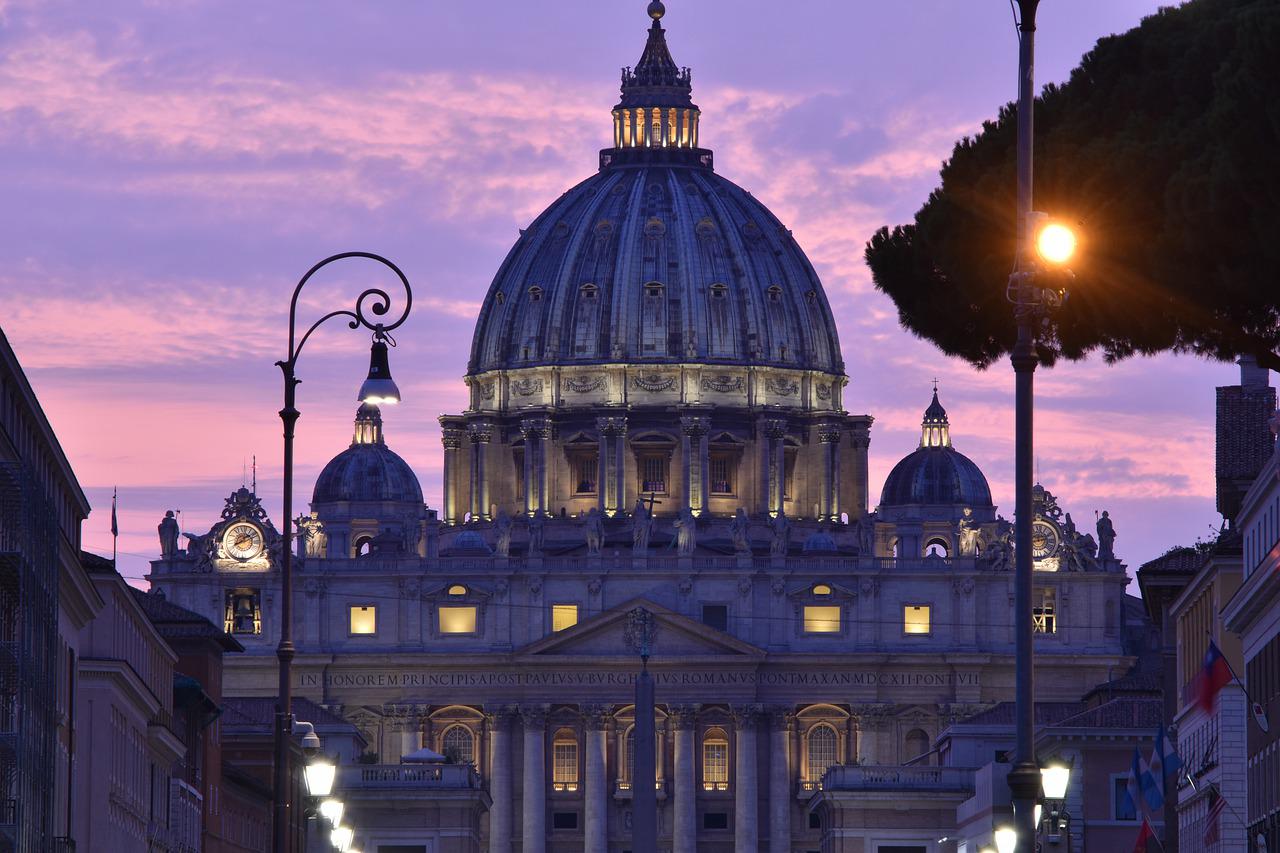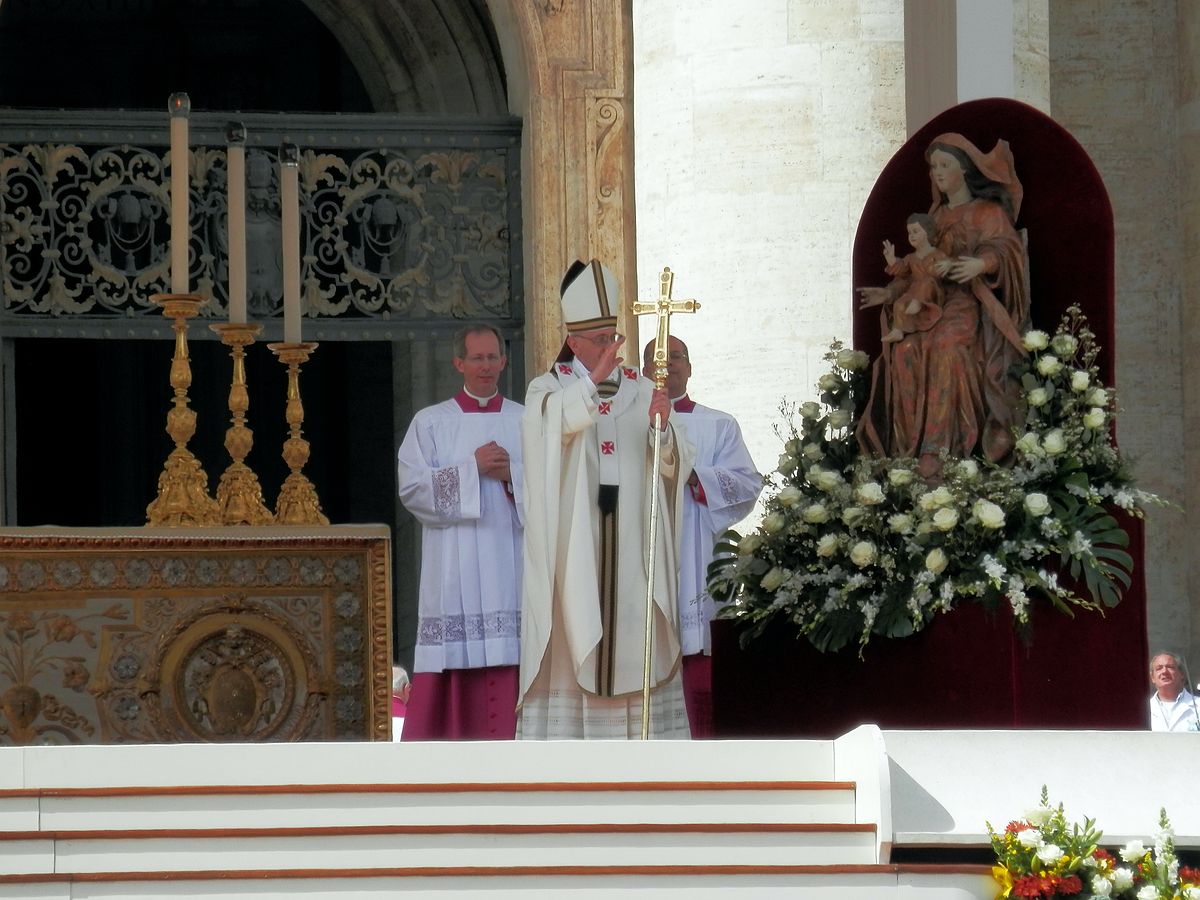The Revolutionary Road of the Italian Church

Under the watchful eye of the Metropolitan of Bologna, Cardinal Matteo Zuppi, whom citizens of the Vatican consider to be one of the leading papabiles, there has been a very disturbing incident, which the Italian press has recognized as the country’s first homosexual church “wedding”. Things are getting worse in the Catholic Church in Italy – and this has a significant impact on the situation of the global Church. Can Catholicism in Italy still be saved?
Paweł Chmielewski
In early June, two homosexuals, Pietro Morotti and Giacomo Spagnoli, entered into a civil union at an office in Budrio near Bologna. Dressed in elegant suits and surrounded by many guests and photographers, they went to the nearby church of St. Lawrence, overseen by the pastor Fr. Gabriele Davalli. Morotti and Spagnoli took their seats in front of the beautifully decorated temple; they were at the center of the ceremony. The Holy Mass began, during which homosexuals, on their way to the presbytery, received special thanks from the celebrant for their many years of activity in the local rainbow pastoral group; a tangible expression of thanks was the apron handed over to them.
There was no public imitation of the sacrament of marriage nor any attempt to give the homosexuals a blessing (this is prohibited by the document of the Congregation for the Doctrine of the Faith of 2021). Nevertheless, the Italian media bluntly wrote about the ceremony as a “gay wedding” – and it is hard to blame them. The ceremony organized in the Italian church is vividly reminiscent of the heretical excesses that we have associated so far with the Catholic Church in Germany, Austria, and Switzerland. Italy was considered by the general public to be a country that was still more orthodox in comparison.
It is difficult to make general judgments about the orthodoxy of the whole of Italy, and this is because of the particular fragmentation of the Italian Church, divided into over 220 dioceses (compared to 41 in Poland) and over 25,000 parishes (around 10,000 in Poland). However, one will undoubtedly look for orthodoxy wherever Budrio is – that is in the Archdiocese of Bologna, where Matteo Zuppi has been holding the metropolitan authority since 2015, appointed cardinal in 2019, and made chairman of the Italian Episcopal Conference by the Pope this year.
RAINBOW ZUPPI
The organizer of the homosexual incident in Budrio, Fr. Davalli, did not act arbitrarily; in an interview with the Italian press, he explained that he had personally informed Cardinal Zuppi about his plans to organize a quasi-wedding for two gay men. This information is probably true, because the press service of the Archdiocese of Bologna, when inquired about the matter by the media, only replied that they did not see any problem, since it was a “thanksgiving” Mass.
Zuppi’s support for this type of scandal fits in perfectly with his current activities in the field of the sexual revolution. The hierarch, born in 1955 in Rome, has already proven to be a staunch friend of the LGBT community many times. In 2016, he spoke out against homophobia, which he put on an equal footing with the problem of violence against women. In 2018, an Italian-language edition of the book of the famous foreman of the rainbow offensive from overseas, Fr. James Martin SJ. The work has a foreword by Zuppi. The criticism that fell on him for this did not stop him from making another leap of this kind: in 2020 he wrote an introduction to a pro-gay work by Lucian Moia. Zuppi’s words, according to which “no one can choose their sexual orientation”, particularly resonated with the general public. When Francis appointed Zuppi president of the Italian Episcopate, a politician of the Italian Democratic Party, Alessandro Zan, a leftist and long-time LGBT activist, did not hide his joy. Zuppi can also count on the support of Freemasonry: he was congratulated by Gioele Magaldi, grand master of Grande Oriente Democratico, a masonic lodge in Italy.
DANGEROUS “DIPLOMACY”
Zuppi is currently considered to be one of the leading papabiles. It is not only about his liberal views, or even about his manifest of “poverty” – walking with a worn briefcase, cycling, being close to the homeless or immigrants after the election of Pope Jorge Maria Bergoglio is no longer anything special. Zuppi has one advantage that no other cardinal has. He is the informal chaplain of an influential church group, Sant’Egidio. The community was founded in 1968 by 18-year-old Andrea Riccardi, transforming it over time into an extremely active charity organization on several continents, which is also involved in great politics. Riccardi, professor and former politician, is well known for his dislike of Poles. This is evidenced in private conversations by those who had the dubious privilege of meeting him in person, referencing frequent derisive remarks directed at our countrymen; Riccardi’s public words are also proof of his distaste of Poles. In the book “The Church is Burning” published last year, Riccardi portrayed Poles as fierce anti-Semites, repeating the worst lies known to us from virulent Jewish, Russian, or German anti-Polish philippic press outlets.
The head of Sant’Egidio thinks very highly of himself: shortly after the start of the Russian invasion of Ukraine, he proposed to involve his community in a mediation initiative. He proposed building a new “security infrastructure” with Russia through “cooperative dialogue” because – as he pointed out – although he is not a defender of Vladimir Putin, Russia’s “imperial reaction” is a response to its “humiliation and encirclement by NATO”. Riccardi’s anti-Polish and pro-Moscow sentiments undoubtedly have an impact on the attitude of Cardinal Zuppi. At one time, the most prominent Italian Vaticanist Sandro Magister wrote h arshly that if Zuppi were to ever replace Francis, Andrea Riccardi would really be the Pope-in-fact.
THE CRISIS OF THE ITALIAN CHURCH
It is no coincidence that a leading role in the Catholic Church in Italy today is played by someone like Zuppi – a friend of the left, the LGBT community, and Freemasons, and the “chaplain” of Sant’Egidio. Catholicism in Italy is experiencing an extremely serious crisis today. It is visible at the level of social and political life: since 2016, homosexual civil unions have been legal in Italy, despite the evidently critical position of the Catholic Church towards such legal solutions. Since 1978, it has been legal in Italy to kill unborn children up to the point of the end of the third month of pregnancy, without any cause. Over the years, this has resulted in the killing of over 100,000 children every year. This tragic state of affairs is not giving rise to any significant debate, despite the fact that the demographic crisis in Italy is one of the most serious in the world. Although Poland has one of the lowest fertility rates in the whole world, the Italians managed to beat us: in 2021, Italy saw less than 400,000 children born, while over 700,000 people died.
Things have never been this bad in Italian history, and everything indicates that things will get even worse. Italy is threatened with biological destruction, and the Church is unable to offer a clear voice on this matter. This alone illustrates the disastrous intellectual state of Italian Catholicism.
A NEW DEVOTION
The collapse was also illustrated by the behavior of the Church in Italy during the COVID-19 pandemic. The Italian authorities imposed restrictions on society much more severe than, for example, the Polish ones, and they were accepted without major protests. Catholics allowed themselves to be overcome by panic and sacrificed their religious life on the altar of “sanitaryism”. In many dioceses, especially at the beginning of the pandemic, churches were closed completely. The covid madness in Italy was of course influenced by the attitude of the Holy See itself; The Vatican City was one of the last countries in the world to abolish stringent requirements in 2022, in particular the need to present a certificate of vaccination against COVID-19.
Traditional religiosity was disappearing earlier. The superstitiousness typical of Italians has been heated for several decades by the newfangled ideological currents under the sign of New Age. In Italy, exorcists are highly sought after, which is largely related to the great popularity of divination, witchcraft, or even Satanism among part of the society.
As in Poland, the movement for the traditional liturgy is relatively weak in Italy, and neo-charismatic communities are growing in strength, which, in place of rational faith, introduce emotional religiosity with a shamanist flair. All of this is naturally accompanied by a vocational crisis: over the past 30 years, the number of Italian priests has decreased by almost 30%. And this is just the beginning of the disaster, because nearly 20% of Italian clergy is around 80 years old.
A NEED FOR SAINTS
The homeland of countless saints has become a space for unhindered activities of the anti-Christian revolution. The Italian Church appears to be completely powerless against the tendencies that are destroying Catholicism. The activity of the Archbishop of Bologna in this context is not surprising: Matteo Zuppi appears to be the ideal president of the episcopate, who has been swimming with the tide for years, unable to even hide his inclination towards neo-Marxist ideology. Many of those in the Vatican believe that Francis has entrusted Zuppi with a new function to test him against a possible papacy.
Hopefully the cardinals will find this test unsuccessful. As the new pope, Zuppi would probably contribute to a serious deepening of all the fundamental problems that plague the Church today: intellectual weakness, softness in dialogue with the world, and susceptibility to political influences. Rather than people like the present Metropolitan of Bologna, the Church in Italy, and with it the universal Church, needs new saints like St. Francis of Assisi, St. Thomas Aquinas, St. Catherine of Siena or St. Robert Bellarmine: in a word, people who, through their radical devotion to God, have been able to lift the Church from a deep decline in the past centuries.
The author is a journalist and publicist for the Catholic news outlet PCh24.pl




